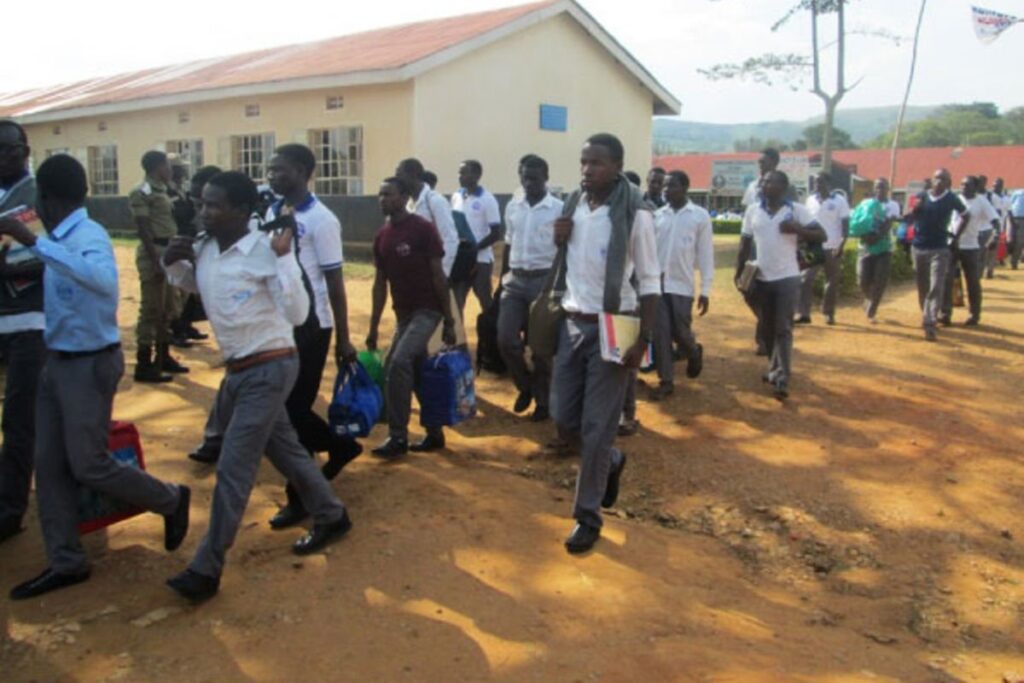By Nankumbi Rebecca
A section of social media us-ers have held mockery jubilations over the demise of the former Minister of Security Gen. Elly Tumwiine. This follows Gen. Tumwiine’s warning in November 2021 riots that sparked off due to the arrest of NUP Leader and former NUP Presidential Candidate Kyagulanyi Robert alias Bobiwine.
Gen. Tumwiine stretched out that police has a right to kill rioters if they reached a certain ex-tent of violence. The protest left over 60 people killed by Security Forces.
Just like societal riots that are politically motivated, school riots/strikes are no different. And have been happening for a long time mainly in Secondary School and tertiary institutions. The rioting students tend to think that it will be the only way they will be listened to mainly if their issues have for long been ignored by the school administration.
School strikes are mainly due to poor feeding, maltreatment from school staff, expulsion of one of the students, strict school rules and regulations, lack of transparency, punishments, poor or no teaching and sometimes teachers’ influence mainly when the teachers want to get rid of the head teacher or a particular teacher deemed royal to the head teacher, they can use students to humiliate the teacher.
Do the striking students think over what they are to do or all that happens is impulsive? And do they get what they protested for are the causes always justifiable?
Just like natives celebrating a general’s death and how they have conveniently eliminated the last statement he made “if they reached a certain extent of violence” and are only fronting the first part. “Police has right to kill rioters” so as to make his remarks ambiguous; when students want to strike, they will even twist facts on ground to justify the actions so as to reach their intended goal.
The example the students who are at a vibrant stage get from the society is that for any underlying issue the only way to solve it is through violence and not dialogue, the students tend to think strikes are the only way out for a change.
School administration need to be vigilant on information reaching them about intended strike because the damage caused after the strike put a huge financial bur-den on the school. Most strikes occur towards the end of term.
Mr. Isabirye David a Veteran educationist and former head teacher of Kiira College Butiki, Vividly remembers the student’s strike at Kiira College Butiki in 1984. As a newly posted Head teacher taking over from Mr. Musanyana who had been transferred to Bugwere high, a tip off from a senior one student about the plot to burn the school enabled him know was to happen.
He says he immediately alerted the Jinja Police who came to the school and addressed the students. The students in response reassured the Policemen of their love for the school and expressed great for the new head teacher. This convinced the policemen though Mr. Isabirye remained skeptical of the student’s intentions. Only for students to burn the school administration, Head teachers house, livestock im-mediately after the police leaving. The students also burnt the houses and livestock of the teachers deemed royal to Mr. Isabirye and also raped some female teachers. It’s one of the most violent strikes in Ugandan history. Their major complain was strict administration and too many ex-aminations.
Mr. Isabirye recalls how parents rushed to pick the children after hearing the news from local radio stations and BBC. The candidate class students for that year missed their exams including the Bugweri MP Hon. Abdul Katuntu forcing them to repeat the class.
Interestingly some of the expelled student joined the former Head teacher Mr. Musanyana at Bugweri High. They still continued with their rebellions acts and Mr. Musanyana for fear of a repeat of what had happened to his successor at Kiira College Butiki behaved permissively towards the students. For example, whenever he would find students escaping, he would tell them in Lugwere “oyaba kubinaku, oyabe” literally meaning are you going for a dance, you go and dance. The school then deterionted academically and in discipline.
Out of that experience, Mr. Isa-birye cautions school heads not quickly refer school riots to police as the believes it just escalates the violence. And students voice should not be just suppressed through punishments and expulsions, rather students should be nurtured to use the power within them to make positive contributions to the school.
He adds that; In order to prevent the mush-rooming violence, schools should empower students and create a transparent communication channel of school administration and student body. This can be achieved through prefect’s body and the student’s council. Also, the school administration needs to create ‘form periods’ where students meet weekly with their class teachers and talk about their grievances about the school and also their aspirations for the school.
Students should take part of the decision making at school. When students are part of policy making, they will trust and obey them and work with school administration to make them work. To make a culture that does not tolerate any form of violence amongst students -students, teachers- teachers and teachers- students by creating guidelines that promote good discipline, students’ safety and always encourage dialogue in-case of any conflict.




